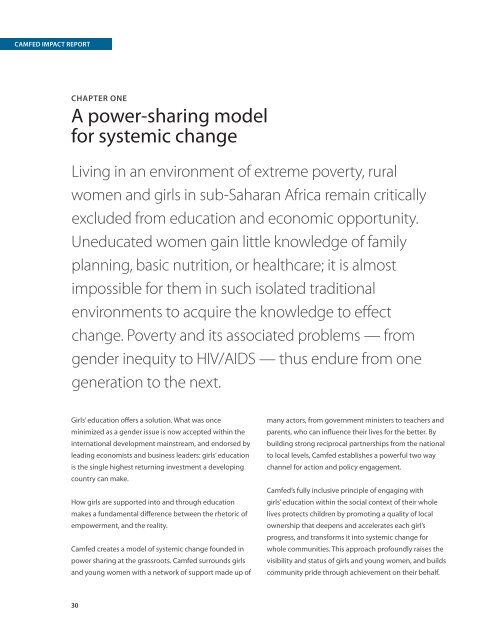Download 2010 Camfed Impact Report PDF - United Nations Girls ...
Download 2010 Camfed Impact Report PDF - United Nations Girls ...
Download 2010 Camfed Impact Report PDF - United Nations Girls ...
Create successful ePaper yourself
Turn your PDF publications into a flip-book with our unique Google optimized e-Paper software.
CAMFED IMPACT REPORT<br />
CHAPTER ONE<br />
A power-sharing model<br />
for systemic change<br />
Living in an environment of extreme poverty, rural<br />
women and girls in sub-Saharan Africa remain critically<br />
excluded from education and economic opportunity.<br />
Uneducated women gain little knowledge of family<br />
planning, basic nutrition, or healthcare; it is almost<br />
impossible for them in such isolated traditional<br />
environments to acquire the knowledge to effect<br />
change. Poverty and its associated problems — from<br />
gender inequity to HIV/AIDS — thus endure from one<br />
generation to the next.<br />
<strong>Girls</strong>’ education offers a solution. What was once<br />
minimized as a gender issue is now accepted within the<br />
international development mainstream, and endorsed by<br />
leading economists and business leaders: girls’ education<br />
is the single highest returning investment a developing<br />
country can make.<br />
How girls are supported into and through education<br />
makes a fundamental difference between the rhetoric of<br />
empowerment, and the reality.<br />
<strong>Camfed</strong> creates a model of systemic change founded in<br />
power sharing at the grassroots. <strong>Camfed</strong> surrounds girls<br />
and young women with a network of support made up of<br />
many actors, from government ministers to teachers and<br />
parents, who can influence their lives for the better. By<br />
building strong reciprocal partnerships from the national<br />
to local levels, <strong>Camfed</strong> establishes a powerful two way<br />
channel for action and policy engagement.<br />
<strong>Camfed</strong>’s fully inclusive principle of engaging with<br />
girls’ education within the social context of their whole<br />
lives protects children by promoting a quality of local<br />
ownership that deepens and accelerates each girl’s<br />
progress, and transforms it into systemic change for<br />
whole communities. This approach profoundly raises the<br />
visibility and status of girls and young women, and builds<br />
community pride through achievement on their behalf.<br />
30
















